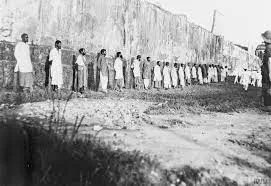Who were executed by Britain for refusing to fight against the Ottomans
On February 15, 1915, the 5th Infantry Regiment of Indian Muslims ignited an epic uprising against the British forces in Singapore, after they refused to fight against the Ottomans at the beginning of World War I, and ended with the execution of most of them, either by hanging or by firing squad.
The moral and material support provided by the Muslims of India to the Ottoman Empire and the Turks during the First World War and the wars of liberation and independence led by Ataturk between 1919 and 1923 is just one of the issues that has remained firmly in the minds and conscience of the Turks to this day. Indian support ranged from assistance in purchasing ammunition for weapons, medicine, food, and clothing, to sending large sums of cash and gold, to military and civil pressure and disobedience activities organized through the Indian Succession Committee.
Another unknown aspect of the support provided by the Muslims of India is the acts of military disobedience and rebellion against the British army during the First World War. On February 15, 1915, one of the most dangerous Indian military revolts against British rule erupted in Singapore, a colony of the British Empire in the Far East at the time. .
The Singapore Mutiny, also known as the Sepoy Rebellion or the Rebellion of the 5th Light Infantry Regiment, was a rebellion waged by nearly half of a regiment of 850 Sepoys (Indian Muslim soldiers) against the British in Singapore during World War I in refusal to send them to fight the Ottoman Empire, and ended with a brutal response by the forces of British occupation.
The Call of the Ottoman Caliph
With the start of World War I officially and the Ottoman Empire entering the war on the side of its German allies, the Ottoman Sultan Mehmed V urged all Muslims in the world to take up arms against the British Empire and its allies.
This call of the Sultan was very important, as at that time nearly half of the world's Muslim population lived under British, French or Russian rule, and these Muslims saw the Ottoman Sultan as their successor and leader. Since the transfer of the Islamic caliphate to Istanbul during the reign of Sultan Selim I in 1517, the Ottoman Sultan became the head of the pyramid of the Islamic caliphate system, which began with the death of Muhammad and continued until the abolition of the caliphate system and the establishment of the modern Turkish Republic.
Although the Ottomans were at their weakest, their influence on the Islamic world continued until the last days of the Islamic caliphate, and their influence continued from Europe to the Middle East and from Africa to the farthest regions of Asia, where the Muslims of India ignited the Singapore rebellion at the beginning of 1915.
Singapore uprising
Shortly after the arrival in Singapore of the 5th Light Infantry Regiment consisting entirely of Rajput Muslims, Mughals and Pashtuns, Indian nationalists belonging to the "Qadr Party" known for their efforts in the struggle for independence against Britain, the Ottoman Empire declared a "great jihad" against Britain and its allies .
The spread of rumors that instead of being sent to Hong Kong, they would be sent to fight against the Ottoman Empire and the Muslims, was instrumental in sparking the uprising against the nation's true enemies, Britain and France.
On February 15, 1915, 850 Indian Muslims (Sepoy soldiers) revolted against the British leaders, killing 40 British officers and seizing their weapons and ammunition. The uprising lasted for about 7 days, as the uprising broke out into three groups and succeeded in not only seizing the forts and arsenals, but also releasing Austrian German prisoners held in British prisons and concentration camps.
Brutal reaction
Fearing that what happened in Singapore would lead to more rebellions and revolutions in other colonies, the British colonial administration brutally punished the Indian prisoners, after it managed to suppress the rebellion with the support of the naval forces of the Allied countries. While most of the 850 soldiers and more than 200 officers involved in the rebellion were hanged or shot, the few remaining were sentenced to imprisonment and to fight against the East African Germans.
On the other hand, while the trials and executions of the Muslim Indian soldiers of the 5th Infantry Regiment began in the martial courts, the British launched counter-propaganda to conceal the true extent of the incident and weaken its impact. It was announced through the official statement and the press that the rebellion had already broken out due to the British refusal of the demands of the regiment that wanted to fight in Europe.
It should be noted that another incident in which the Indian Muslim soldiers rebelled, was the battle of "Kut al-Amara", where the Indian soldiers in the Sixth Division, who were taken to Basra to invade Iraq in 1916, refused. Instead of attacking the Turks, the soldiers began attacking their British colleagues, and fled whenever they found the opportunity from order to join the Ottoman army.
Tags:
HISTORY


